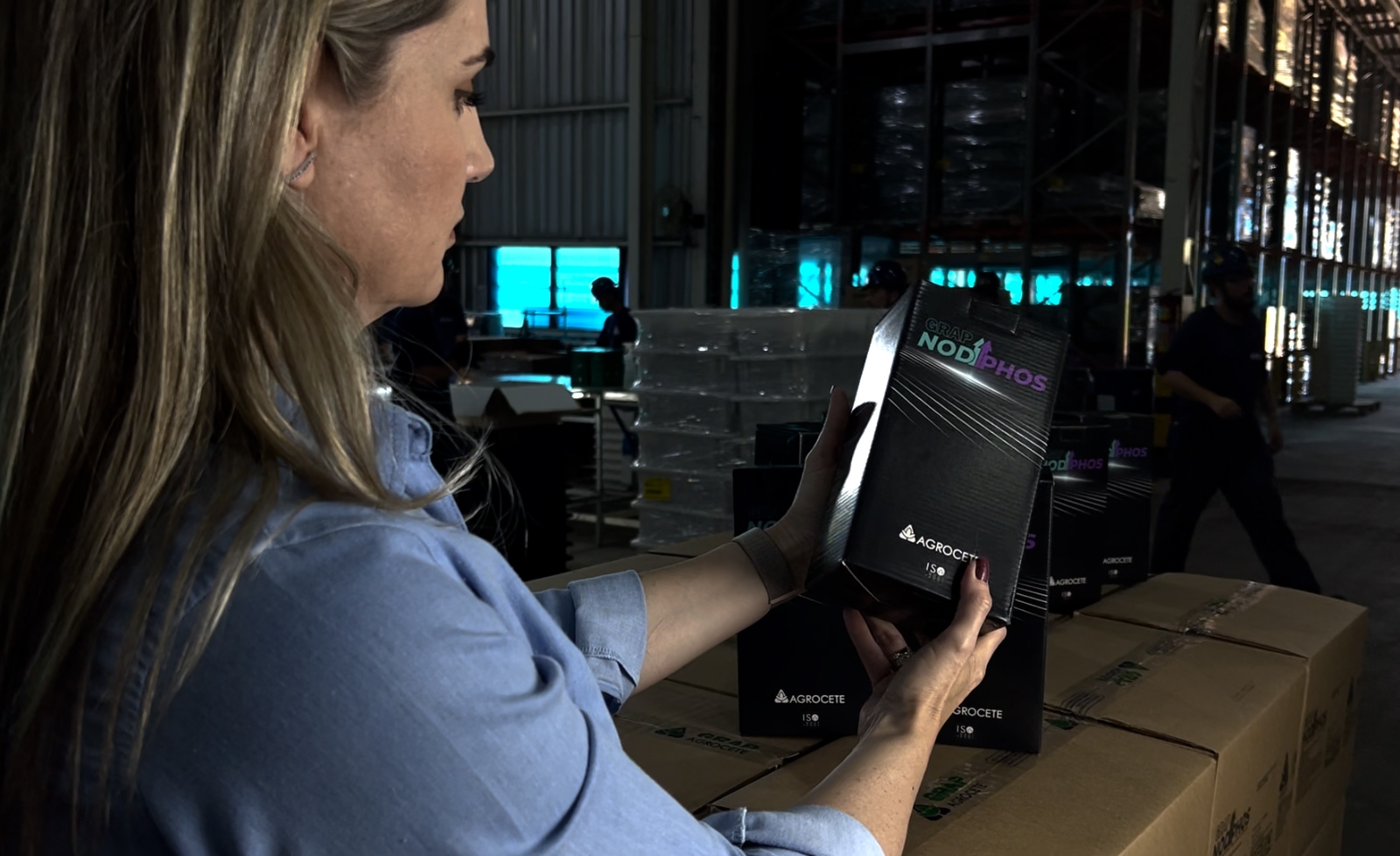
Combining bio-stimulation, nitrogen nutrition, and phosphorus solubilization, the multifunctional NOD PHOS has demonstrated significant results.
Technological innovation brings a 3-in-1 biological product to the market, allowing for the reduction of a portion of phosphate fertilizer while maintaining productivity and reducing costs for farmers. Research conducted by the State University of Western Paraná (Unioeste) in partnership with Agrocete, a Brazilian multinational known for its expertise in adjuvants, physiological products, biologicals, and nutrition, tested the application of only 50% of the recommended phosphorus dose, with and without soybean seed inoculation using NOD PHOS. The study found average yield gains of 27% compared to areas without seed inoculation.
The studies were conducted at four different locations in states such as Paraná, São Paulo, and Mato Grosso do Sul. Statistically, the productivity of the treatment with half the phosphorus dose applied at planting, using Agrocete's new 3-in-1 product, is equivalent to applying 100% of the phosphorus dose. This demonstrates that the product has the potential to replace some of the mineral fertilizer due to its ability to solubilize phosphorus already present in the soil but unavailable to plants.
The other two effects of the biological input were also confirmed by the research: a 31% increase in root volume and a 29% increase in leaf volume due to the release of phytohormones by microorganisms, stimulating natural plant growth. This allows crops to better exploit the available environment and face less pressure from weeds. Additionally, there is a boost in biological nitrogen fixation (BNF) promoted by the Bradyrhizobium inoculant, traditionally used in soybean cultivation but sometimes insufficient to meet the nitrogen demand for high yields.
According to Andrea de Figueiredo Giroldo, Marketing and Development Director at Agrocete, the company's partnership with research institutions is crucial because it validates the effects sought by the company in its new solutions. "The efficiency of the new biological product is evident in the foliar nitrogen and phosphorus levels of the evaluated plants. In the work carried out in Toledo (PR) by UNIOESTE, nitrogen levels were 6% higher and phosphorus levels were 59% higher with the use of NOD PHOS, which certainly contributed to a final increase in productivity of more than 7 sacks of soybeans per hectare."
The use of biologicals in Brazilian agriculture has been growing in recent years. Recent data from ANPII – the National Association of Inoculant Producers and Importers – confirm this trend. According to the organization, the use of biological inoculants has been steadily increasing since 2009 when market surveys began. "Associated industries applied over 134 million doses of biological inoculants in 2022, with more than 80% used in soybean cultivation, but also in corn, sugarcane, and wheat," says Solon Cordeiro de Araujo, executive director of ANPII.
To further enhance the positive results of the studies, NOD PHOS has the advantage of combining three functions in a single package, making it easier for farmers to use and ensuring perfect compatibility among different "beneficial bacteria" strains. When it comes to inoculants containing live bacteria in the formulation, one strain can interfere with another when different products are mixed during field treatment. The director explains that the solution replaces the use of growth-promoting and phosphorus-solubilizing formulations, with the added benefit of containing a microorganism that complements nitrogen fixation, making the product unique for soybeans in Brazil.
NOD PHOS is currently registered for soybeans but is in the process of being registered for corn cultivation as well. Like Azospirillum, the combination of the product can be recommended for most crops. "In all recommended crops, it promotes phosphorus solubilization, phytohormone release, increased root system, growth promotion, nitrogen fixation synergy with Bradyrhizobium, improved water and nutrient absorption, increased stress tolerance, and consequently, increased crop productivity," emphasizes the director of Agrocete.
According to Andrea, the 3-in-1 product can be used in any region of Brazil. "The registration studies were conducted in quite different edaphoclimatic regions, and NOD PHOS showed consistent results in all of these regions," she concludes.
About Agrocete:
Founded in 1980, Agrocete is a Brazilian multinational company headquartered in Ponta Grossa/PR, with units in the United States and Paraguay, internationally recognized in the fields of adjuvants, physiological products, biologicals, and nutrition.
Agrocete boasts the world's largest and most advanced biological inoculant manufacturing facility and is certified under ISO 9001 for management and quality and ISO 14001 for environmental management. It is also recognized with the Together for Sustainability seal, a global initiative certifying companies with a commitment to safe chemical industry practices and environmental responsibility.
The company is a pioneer in the production of special fertilizers and inoculants in Brazil and is known for its technological innovation and modernity from the laboratory to procedures. As evidence of this, it has established a unit for the development, validation, and testing of innovative products, such as bioinputs, biofertilizers, and biostimulants, as well as the Agrocete Academy for employee training. For more information, visit: www.agrocete.com.br.
